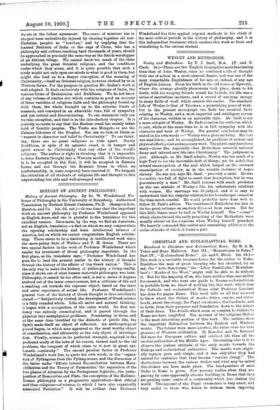HISTORY OF ANCIENT PHILOSOPHY.
History of Ancient Philosophy. By Dr. W. Windelband, Pro• fessor of Philosophy in the University of Strassburg. Authorised Translation by Herbert Ernest Cushman, Ph. D. -(Sampson Low, Marston, and Co. 10s. 6d. net.)—It was time that the important work on ancient philosophy by Professor Windelband appeared in English dress, and one is grateful to the translator for this excellent version. Once more, by the way, we find an American, not an English, translator,—a fact on which we may congratulate the ripening scholarship and keen intellectual interest of America, but on which we cannot congratulate English scholar- ship. There seems to be a slackening in intellectual work since the more palmy days of Wallace and T. H. Green. There are two special factors in the work of Professor Windelband which render his treatment of Greek philosophy important. In the first place, as the translator says, Professor Windelband has gone far to lead the general reader to the history of thought through the history of the affairs of the Greek nation." This is the only way to make the history of philosophy a living reality, since it shows out of what human materials philosophy was born. Philosophy, it cannot be too often said, is not a series of dogmas evolved out of the inner consciousness, but a criticism of life and a reaching out towards the supreme object, based on the inner and outer experience of actual life. Professor Windelband's general view of the history of Greek thought is thus excellently stated:—" Subjectively viewed, the development of Greek science is a fully rounded whole. Like all naïve and natural thinking. it began with a recognition of the outer world. Its first ten- dency was entirely cosmological, and it passed through the physical into metaphysical problems. Foundering in these, and at the same time troubled by the dialectic of public life, the Spirit made itself an object of reflection. An' anthropological period began, in which man appeared as the most worthy object of consideration, and ultimately as the only object of investiga- tion. Finally, science in its perfected strength, acquired in the profound study of the laws of its reason, turned back to the old problems, the conquest of which came to it now in great us-
-, tematic continuity." The second peculiar factor in Professor Windelband's work lies, to quote his own words, in the " separa- tion of Pythagoras from the Pythagoreans, and the discussion of the latter under 'Efforts toward Reconciliation between Hera- cleitatiism and the Theory of Parnienides,' the separation of the two phases of Atomism by the Protagorean Sophistic, the juxta- position of Democritus and Plato, the conception of the Hellenic- Roman philosophy as a progressive application—first ethical and then religious—of science, to which I have also organically connected Patristics." It will be evident that Professor
Windelband has thus applied original methods in his study of the moat critical periods in the history of philosophy, and it is this independent treatment which renders this work so fresh and stimulating to the serious student.


































 Previous page
Previous page